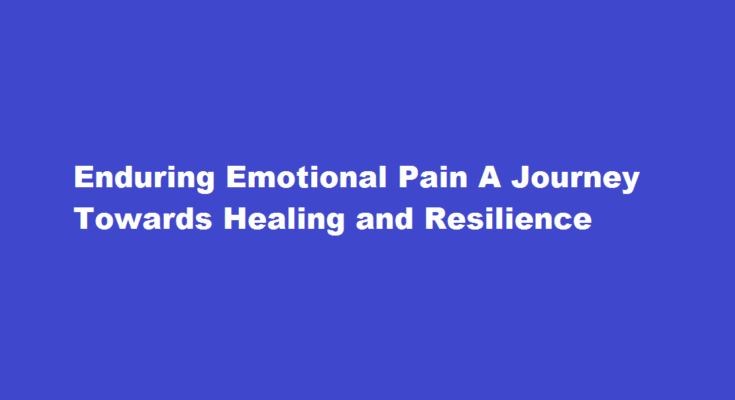Introduction
Emotional pain is an inevitable part of the human experience. It can manifest as heartbreak, loss, betrayal, failure, or any other distressing event that leaves us feeling overwhelmed and vulnerable. While it is tempting to avoid or suppress such emotions, it is essential to acknowledge and confront them to promote healing and personal growth. In this article, we will explore practical strategies to endure emotional pain and emerge stronger and more resilient on the other side.
Embrace Your Emotions
The first step in enduring emotional pain is to acknowledge and accept your feelings. Allow yourself to experience the pain without judgment or shame. Emotions are a natural response to life’s challenges, and denying them will only prolong the healing process. Embracing your emotions is a courageous act that empowers you to face the pain head-on and begin the journey towards healing.
Seek Support
Enduring emotional pain alone can be overwhelming. Reach out to friends, family, or a therapist who can provide a safe and supportive space to express your feelings. Talking about your emotions can be cathartic and help you gain new perspectives on your experiences. Remember, seeking help is a sign of strength, not weakness.
Practice Self-Compassion
During times of emotional pain, it is common to be self-critical and blame yourself for the situation. Instead, practice self-compassion and treat yourself with the same kindness and understanding you would offer to a close friend. Understand that pain is a part of life, and you deserve compassion and love during these challenging moments.
Engage in Healthy Coping Mechanisms
Resist the urge to numb the pain through unhealthy coping mechanisms such as substance abuse or reckless behavior. Instead, opt for healthy activities that promote emotional well-being, such as exercise, meditation, journaling, or engaging in hobbies you enjoy. These coping strategies will help you manage the pain in a constructive manner and avoid further emotional damage.
Focus on Gratitude
When navigating emotional pain, it is easy to get lost in negative thoughts and emotions. Counteract this by consciously focusing on gratitude. Take a moment each day to reflect on the things you are thankful for, no matter how small they may seem. Gratitude can shift your perspective and remind you of the positive aspects of life, even amidst challenging times.
Set Boundaries
During times of emotional vulnerability, it is crucial to set boundaries to protect yourself from further harm. Learn to say no to additional responsibilities or situations that may exacerbate your pain. Setting boundaries empowers you to prioritize your well-being and healing process.
Allow Time for Healing
Healing from emotional pain is a gradual process that cannot be rushed. Be patient with yourself and allow time for wounds to mend. Avoid putting pressure on yourself to “get over” the pain quickly, as this can lead to more emotional distress. Healing takes time, and it is essential to grant yourself that time and space.
Reframe Negative Thoughts
Challenge negative thought patterns that may arise during difficult times. Identify and reframe them in a more positive and constructive light. For instance, instead of dwelling on what went wrong, focus on what you have learned from the experience and how it can contribute to your personal growth.
Engage in Supportive Relationships
Surround yourself with people who uplift and support you. Positive and nurturing relationships can provide a sense of belonging and security during challenging times. Be selective about the company you keep, as the right relationships can significantly impact your ability to endure emotional pain.
Practice Mindfulness
Mindfulness involves staying present in the moment without judgment. Engaging in mindfulness exercises can help you stay grounded during emotionally turbulent times. Through mindfulness, you can observe your emotions without becoming overwhelmed by them, allowing for greater clarity and self-awareness.
Frequently Asked Questions
What are the most common emotional responses to pain?
The typical emotional reaction to pain includes anxiety, fear, anger, guilt, frustration, and depression. Emotions shape our experience of the pain via neural connections and are powerful drivers of behavior.
How do you endure emotional pain?
The typical emotional reaction to pain includes anxiety, fear, anger, guilt, frustration, and depression. Emotions shape our experience of the pain via neural connections and are powerful drivers of behavior.
Conclusion
Enduring emotional pain is a transformative journey that requires patience, self-compassion, and support. Embrace your emotions, seek help when needed, and engage in healthy coping mechanisms to promote healing and resilience. Remember that pain is a natural part of life, and by confronting it head-on, you have the opportunity to emerge stronger, wiser, and more compassionate towards yourself and others. Trust in your ability to endure and heal, and remember that brighter days lie ahead.
Read Also : Enduring Physical Pain Strategies for Resilience and Recovery



